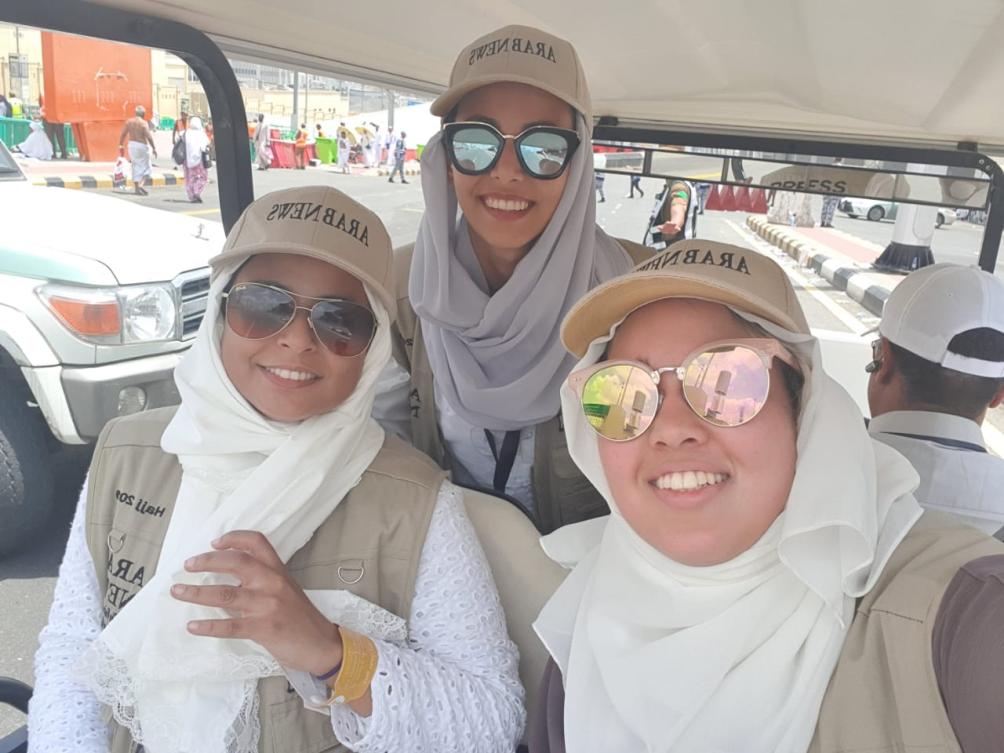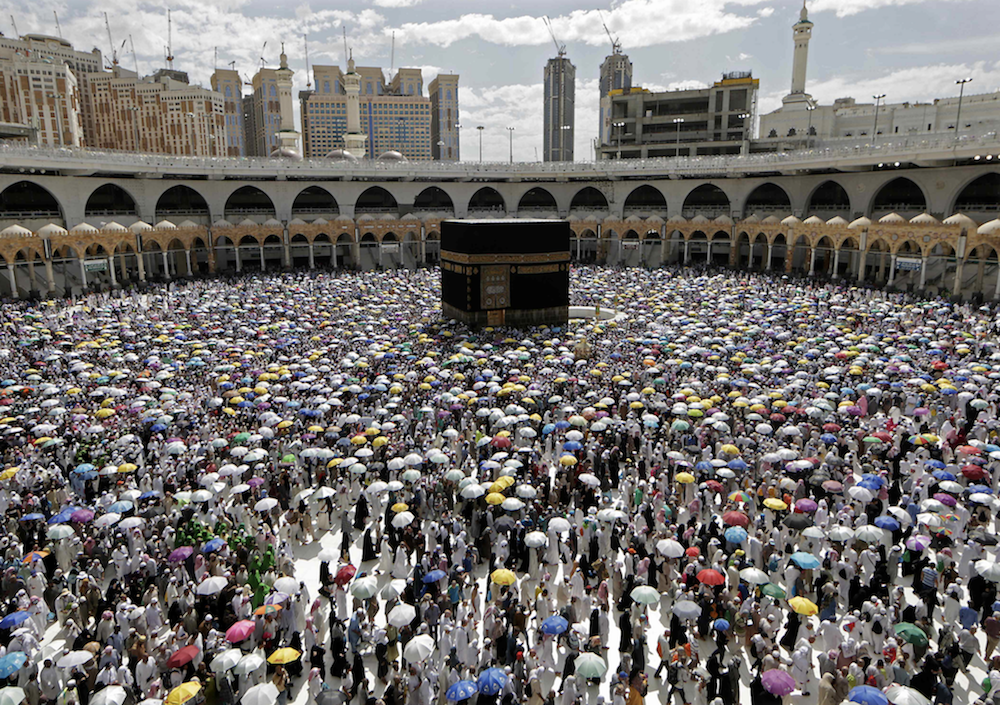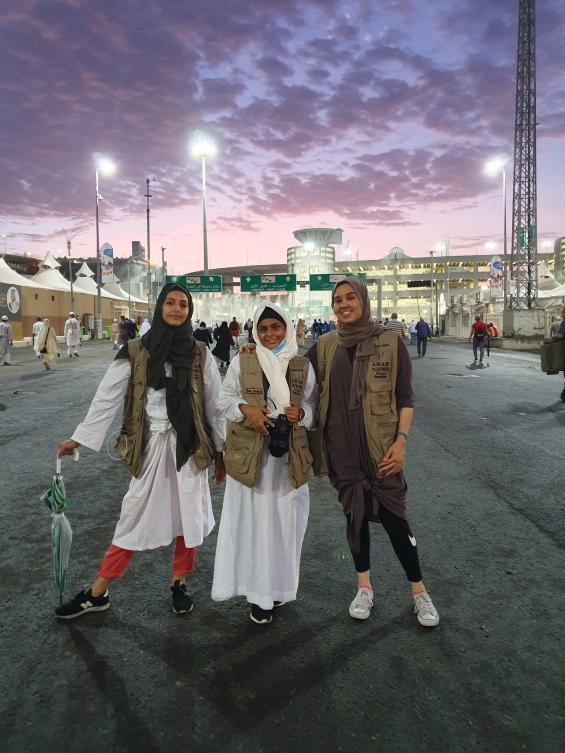RIYADH/DUBAI: Joining a procession of millions taking part in their once-in-a-lifetime pilgrimage, three Arab News female staff members embarked on a very personal, spiritual and professional journey in 2019.
Coming from three Arab News bureaus, reporter Hala Tashkandi from Riyadh, senior reporter Rua’a Al-Ameri from Dubai and photographer Huda Bashatah from Jeddah set out to be the first and only all female on-the-ground editorial team to cover Hajj that year.

On her first visit to the Kingdom, Al-Ameri was not sure what to expect. After 23-hour journey of connecting flights, delays and a few hours waiting at Jeddah airport, Al-Ameri joined the team as they made their way to the holy city of Makkah.
“The road leading to the holy city was jam-packed, and we were nervously waiting for our documents to be emailed from the ministry to allow us through the Saudi security checkpoints. Like in a James Bond movie, our passes arrived just seconds before we reached the guards,” said Al-Ameri.
Upon reaching the Ministry of Hajj camp, the three of them set out their plans to document the spiritual journey taken by millions of devoted Muslims while performing their own pilgrimage, a balance that required stamina, endurance and a strong will, characteristics that the trio are known for in their respective bureaus.
The granddaughter of a Hajj expert, Tashkandi co-led the team as she had performed her pilgrimage before and had heard stories from her grandfather about the tough journey ahead of them.

“I took the responsibility of showcasing the pilgrimage in more ways than one,” said Tashkandi. “As a Muslim, I loved being able to show the world one of the most beautiful and sacred rituals in our religion. As a Saudi, I was eager to laud our government for the amazing efforts they made in ensuring a smooth and safe pilgrimage for all of the holy city’s guests. And as a woman, and a member of an all-female main team, I was determined to prove that the three of us were just as capable of handling ourselves as our male colleagues during what was obviously a grueling, fast-paced, intense coverage.”
Hajj is not the easiest of rituals, and the team walked for hours under the blistering sun. The work never stopped in the evenings as they continued reporting. “It was tough, and despite packing light clothes and abayas, nothing could have prepared me for the blistering heat. And if I was not getting fried by the sun, I was getting drenched by the rain – which flooded the camp I was staying in,” said Al-Ameri.
Tashkandi recalled the noise, the chaos, the beauty and the unity she felt as if it were her first time. “You are reminded of all the things you have to be thankful for. It is beautiful. People from every country, in every skin tone, from every social class, from every level of education, all as close to equal as they can possibly get,” she said. “All heading in one direction, with one unstoppable goal, united in prayer and spirituality and love. It is a feeling you can only experience in one place on Earth.”

As the team photographer, Bashatah was tasked with a challenging role that is usually the preserve of men, yet she was able to send to HQ some of the most personal photos and stories ever featured in the newspaper. Meeting people from all walks of life with her camera in tow, Bashatah dived into the crowds, often getting lost but later returning with fascinating things to share.
“I didn’t see any female photographers at the holy sites. There were only men taking pictures during Hajj, which motivated me to work harder to give my best. Taking pictures in crowds, among children, women and old pilgrims, was the biggest challenge I have ever faced and a great responsibility since it was my first experience of Hajj, as well,” said Bashatah.
The trio’s experiences varied but there were moments where each one felt a connection to the true meaning of Hajj, unity.
“I saw an old man in his wheelchair and as I approached him to take a picture, he smiled and spoke words in his Iraqi accent that I still vividly remember: “You are really sweet, my girl. Are you taking pictures of us so that you can come and visit us in Basra when you miss us?” Tears welled up and I kissed him on his head and told him “we will meet again soon,” said Bashatah.
Al-Ameri recalls one incident when the flooding shut down the power and she was forced to write her report on her mobile phone. Sitting quietly in a corner at their accommodation, dripping wet from the rain and up against her Dubai deadline, the reporter was tapping away on her phone when out of nowhere she was offered help in the kindest manner.
“A kind young woman saw me, and graciously put a towel on my head to keep me warm as I worked. And it was that kind gesture that represented to me the meaning of this journey. To be selfless and to help those around you, a strong message in Islam,” she said.

On their last stop before returning to Jeddah, the trio performed Tawaf Al-Ifadah, the act of going around the Kaaba seven times to end their pilgrimage. Mesmerized by grandeur of the holy Kaaba, this was Al-Ameri’s first visit to the Holy Mosque and in keeping with the spiritual connection of the pilgrimage, it made sense to complete her journey by touching the walls of the holiest site in Islam. Passing through the crowds toward the magnificent structure with the help of her fellow colleagues, Al-Ameri finally reached the high walls of the holy Kaaba and with that, her journey was complete. A surreal moment that she hopes to experience again.
The trio helped one another along, lifting each other’s spirits, laughing, crying and bonding over Saudi Arabia’s famous spiced fried chicken, Al-Baik, and huddling together under an umbrella to protect themselves from torrential rains. When they didn’t have a place to sleep, they talked their way into a makeshift mosque and slept alongside 20 other people, using their shoes as pillows. They used cookies to persuade an officer to help them find a ride back to their camp after they were stranded. It all made for an exhilarating and exhausting experience but, as far as a journalist’s job goes, that’s exactly the way it should be.

“To choose a single moment that shaped my view of the experience is impossible,” said Tashkandi. “Everywhere you look during Hajj, you see kindness, you see pilgrims sharing their umbrellas with strangers to shield them from harsh sun and sudden rain, people having intense conversations in different languages but still managing to get their points across. You see charity. You see laughter. You see shared joy. You see the very best of humanity.”


































